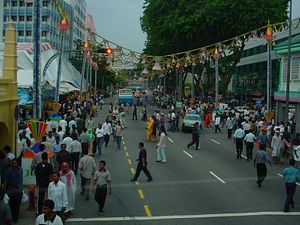A recent bill introduced in Singapore will give police in the Little India district the authority to strip search foreign workers in order to prevent unruly behavior set off by excessive alcohol consumption. This bill comes as a response to the December 8 riot in Little India, which was triggered by the death of a construction worker from India, who was hit by a private bus. Since the incident, the bus driver, a Singaporean, had been arrested and charged with causing death by a negligent act. He is currently out on bail.*
The temporary law which will give police the power to stop, search, interview and detain individuals for alcohol and weapons, and will be valid for one year. Authorities will also be able to ban people from the area they deem a potential threat to public safety. How these enhanced police powers are supposed to improve public safety in Little India is still unclear. On the contrary, these “temporary” measures may in fact pose a challenge to civil liberties and contribute to the disaffection among foreign workers in Singapore.
In addition to the alcohol restrictions, the number of private buses transporting foreign workers from their dormitories to Little India on Sundays has been cut by half. Whether these measures will exacerbate or alleviate the problem remains to be seen. Since the introduction of the bill, there has been little debate over its implications for Singapore society. Even the Singapore Law Society is barred from comment unless the legislation is “submitted to it” by the government. This is a result of the amendment to the Legal Profession Act passed in 1986.
The riot attracted significant international attention, and sparked debate on the integration—or lack thereof—of low-wage foreign labor in the wealthy city-state. In Singapore itself, portrayal of the riot by the government and the media has been one-sided. For instance, few, if any media interviews were conducted with foreign workers in Little India following the riot. A survey commissioned by the government of about 150 departing foreign construction workers last year suggest the majority were satisfied with their overall working experience. However, the reliability of the survey is questionable, given they were conducted by a government that has wide discretionary powers to revoke re-entry permits and deport without prosecution.
Besides continuing to educate foreigners about Singapore laws and its culture, the Singapore government recently announced that it would dedicate more gathering spaces to meet the needs of foreign workers in future. However, workers also need safe avenues to vent their frustrations and seek counsel if required. Providing forms of redress and appropriate remedies to protect rights may prevent a seething cauldron of anger from overflowing.
There are about 1.3 million foreigners in Singapore, of whom nearly one million are considered “low-skilled” workers who take on menial jobs such as construction work, which are shunned by local Singaporeans. That means that in a population of 5.4 million, nearly one out of five are low-skilled foreign workers, of whom about one in three (around 306,500) are foreign construction workers. These jobs are held predominantly by male workers from India, Bangladesh and Sri Lanka who earn a basic monthly salary of between S$460 and S$700 ($365-$556), according to Transient Workers Count Too, a non-profit organization in Singapore that aims to improve conditions for low-wage migrant workers. After paying for rent and food, these workers have little left to send home to their families. With their low wages, Singapore will continue to rely on importing foreign labor for certain industries such as construction, shipyard and domestic work. The high availability of low-cost labor from surrounding countries will stymie efforts to improve wages and employ locals in these industries.
Because of the scarcity of land, many of these foreign workers are housed on industrial or warehouse premises, some of which are located in remote areas of Singapore, with no space for recreation. Many of these workers are even charged a rent for living in these dormitories, which are often cramped, poorly-ventilated and unsanitary. It is perhaps no wonder then that places like Little India have become a popular recreational spot for foreign workers. However, with their movements curtailed and their freedoms restricted as a result of the introduction of this recent bill, these workers will soon have little room to breathe, much less drink.
Such temporary and location-specific measures can only be a superficial solution to a deep-seated problem that will not be resolved until the country decides to confront the real issues lying beneath its grand, glass-clad high rises and spotlessly clean shopping districts.
* In fact, authorities have decided not to prosecute the driver.

































